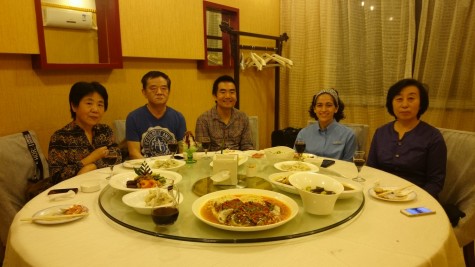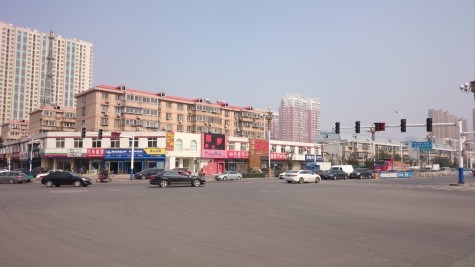Time to say our goodbyes to Beijing and Beijing family. But first, a final stop at the hospital to see my mom. The previous day, while we were at the Summer Palace, my mom’s brother, sister, and sister-in-law came to visit from Tangshan since my mom won’t be able to travel there. My aunt stayed overnight so she could give my dad a break and also travel with us to Tangshan the next day.
We headed to the bus station at around 10 AM. The bus arrived at around noon. Thanks, holiday traffic. After an uneventful ride, we arrived in Tangshan around 3 PM. Tangshan is where I was born. My uncle and aunt still live in the same building where I lived, though my other aunt, with whom we were staying, had moved out earlier.
A quick note about the Chinese language. Chinese is basically divided into three types of conversations:
- Haggling
- Food
- What to call a relative
If that last one seems weird, it’s because it is. Two factors make any conversation between Chinese people have a 33% chance likelihood of just figuring out how to address someone. The first is that Chinese don’t call family members by their given names (i.e., Richard). Everyone calls everyone else by their familial titles (i.e., grandma or uncle). Thus, knowing who someone is, as opposed to just their name, is essential. Secondly, Chinese familial titles are unbelievably specific. This is probably best illustrated by example. I have four aunts. In English, I would call each one of them aunt. In Chinese, they each have four different familial titles.
Unlike English, what title a relative has is dependent upon several variables, such as:
- What side of the family they’re on (mom or dad)
- If they’re a blood relative or married in
- If they’re older or younger than the relevant parent
- If they’re older or younger than I am (for same generational relatives)
These are the major variables. To illustrate via a simple example, there is no word for brother or sister. There is only older brother/sister and younger brother/sister. This is reasonably easy to wrap one’s head around. Moving up a generation is where things get annoying. Take my four aunts. Their four titles, and why they have different titles, are:
- Gu Gu – Younger sister of dad
- Da Ma – Wife of older brother of dad
- Xiao Yi – Younger sister of mom
- Jiu Mu – Wife of younger brother of mom
If, for instance, my dad’s brother were younger than he is, then Da Ma would be Shu Ma. If Xiao Yi were older than my mom, then she would be Da Yi. See why Chinese talk about this so much? These conversations become more commonplace after a wedding or a birth, when everyone is trying to sort out who calls whom what. Particularly entertaining on this trip is that Cindy has to call everyone what I call them. That means she has to sort out my four aunts and know what different title to call them in Chinese. It’s amazingly hilarious.
One last thing, don’t forget that it also happens in reverse. Not only do you have to know what to call other people, you have to know what other people are supposed to call you. The last thing you want is to be rude and not know that someone is trying to talk to you, because they sure as hell aren’t going to say your name. Here’s what my dad family calls him:
- Xiao Di – By his older brother
- Er Ge – By his little sister
- Shu Shu – By his older brother’s daughter
- Jiu Jiu – By his little sister’s daughter
Moral of the story, if you see Chinese people yelling at each other, they’re not actually angry. They’re just trying to figure out what to call each other.
Back to Tangshan. It’s a dirty, gritty, industrial city with a population of almost 8 million. Its first big industry was coal, and now it’s into manufacturing, machinery, chemicals, and textiles. Imagine if Detroit and Pittsburgh had a baby in a West Virginia coal mine, and that baby has a population roughly twice of size of downtown Los Angeles. That would be Tangshan. And it’s home.
We just chilled out a little bit at Xiao Yi’s until it was dinner time. We ate with Jiu Jiu (mom’s younger brother) and Jiu Mu. They all agreed that Cindy was a good eater.

 Español
Español

OMG. This was such an intresting and hilarious post. I learn so much from both of you and your trip. Keep posting please. And be safe around the world.